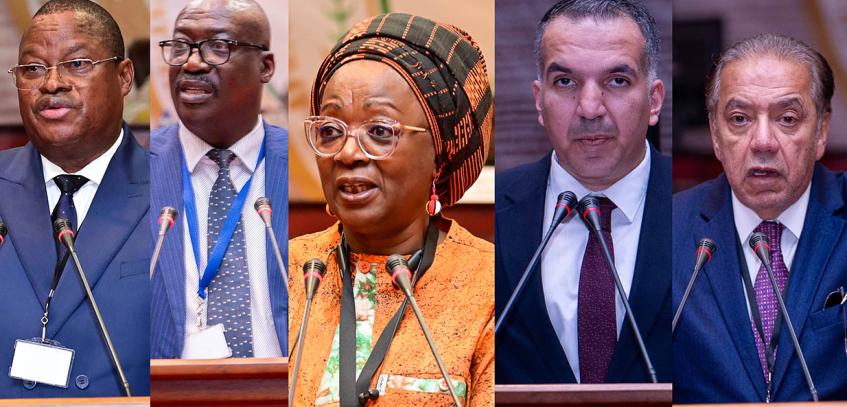The Plenary of the Pan-African Parliament has adopted a series of reports aimed at guiding Africa’s socio-economic and human rights agenda. During the Fourth Ordinary Session of the Sixth Parliament, Permanent Committees presented comprehensive reports on critical issues facing the continent, emphasizing the African Union (AU) Theme for 2024 : “Educate an African Fit for the 21st Century: Building Resilient Education Systems for Increased Access to Inclusive, Lifelong, Quality, and Relevant Learning in Africa.” Discussions centered on strengthening education systems and ensuring inclusivity for Africa’s children, women, and vulnerable populations.
The Committee on Justice and Human Rights Chairperson Hon. Jean Marie Nibirantije delivered the Activity Report for September to November 2024. Hon. Nibirantije highlighted the AU’s dedication to safeguarding child rights as part of Agenda 2063, noting persistent challenges such as child marriage, female genital mutilation (FGM), and drug abuse. The Pan-African Parliament recently held a seminar to raise awareness on effective child protection policies. Its recommendations called for enhanced regional collaboration, better data collection, and stronger stakeholder engagement. The committee’s resolution urged member states to prioritize child protection, aligning with the AU's vision of a safe, exploitation-free environment for all African children.
Hon. Koudio Kouakuo Bertin, Chairperson of the Committee on Education, Culture, Tourism, and Human Resources, presented outcomes from a workshop held in collaboration with the International Centre for Girls’ and Women’s Education in Africa (AU/CIEFFA) from October 28–30, 2024. The workshop focused on advancing girls’ education and expanding vocational training opportunities. Resolutions adopted underscored the need for gender-sensitive policies and greater investment in vocational training to empower young women with skills for Africa’s evolving economies. The #AfricaEducateHer campaign, a focal point of discussion, gained strong support from parliamentarians advocating for accessible, high-quality education for girls across the continent.
Hon. Mahmoud El-Sayed Mohamed Saad, Deputy Chairperson of the Committee on Health, Labour, and Social Affairs, reported on a joint seminar titled “Fostering an Africa Fit for Children,” addressing child labour, healthcare access, and challenges faced by children with albinism. Seminar recommendations emphasized regional cooperation, addressing policy gaps, and culturally sensitive approaches to child protection. Hon. Saad advocated for better data collection and investments in human resources to create supportive environments for African children’s development. The committee called for a unified approach to tackle issues such as drug abuse and stigma faced by children with albinism.
Hon. Dr. Eng. Sherif El Gabaly, Chairperson of the Committee on Cooperation, International Relations, and Conflict Resolution, reported on insights from the UN Summit of the Future 2024. His presentation highlighted global challenges like climate change, conflict, and migration, and detailed the Pact for the Future, which promotes a more integrated and peaceful global order. A key resolution was the adoption of a Model Law on the Right to Nationality and the Eradication of Statelessness, ensuring Africans’ rights to nationality are protected.
The Committee on Gender, Family, Youth, and People with Disabilities, led by Hon. Dao Gabala Mariam, reported on an advocacy mission to promote AU protocols supporting rights for persons with disabilities, the elderly, and vulnerable groups. Hon. Mariam’s report called for inclusive policies to support socio-economic integration and improve social protection for these groups. Parliamentarians strongly supported these recommendations, highlighting the need for policy alignment across African nations to uphold citizens' rights.
These discussions underscore the Pan-African Parliament’s crucial role in advancing AU goals. By adopting these reports, the Permanent Committees reinforced their commitment to addressing Africa’s pressing challenges, from child protection and gender equality to the eradication of statelessness. With these resolutions progressing toward implementation, Africa is moving closer to a more inclusive, sustainable, and equitable future, aligning with Agenda 2063 and the AU’s strategic objectives for a thriving continent.
-Ends-








